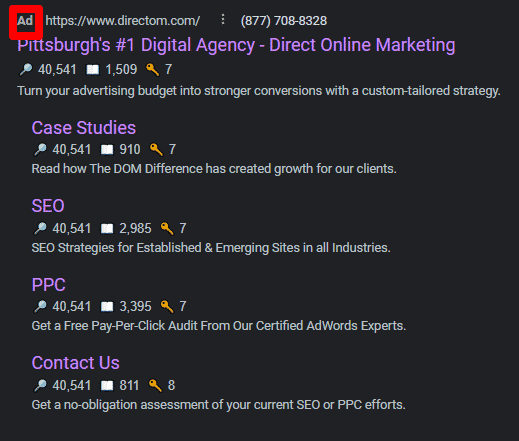Also referred to as “organic results”, a natural listing is a non-advertised result found in search engines. Some search engines may charge a fee to be included in their natural listings, although most are free. How high or low your website is ranked depends on many factors, two of the most important being content relevance and Link Popularity.
More Questions People Ask About Natural Listings
What Is ‘Natural Search’ In Marketing?
Today, “natural listing” results or “natural search” results are commonly referred to using the word “organic.” In today’s competitive online marketplace, results that are completely organic or natural are very hard to come by. That said, natural search in marketing refers to relevant web pages provided by a search engine for a query that are not supported by advertising.
For a visual example of a “natural search” result, see the image below.
By comparison, “paid search” in marketing has a hard dollar amount supporting the ranking it is given in search engine results. In most cases today, the paid search listings show up above the natural listing results or immediately below them.
What’s The Difference Between Paid And Organic Listings?
The biggest difference between paid and organic search engine result listings? The cost involved in the placement.
Regardless of whether you work with a digital marketing agency to manage your campaigns or not, paid search results have a dollar amount connected to their placement. The business running the ad in the number one paid search position is committed to paying a fixed dollar amount to occupy that spot, and they make a payment each time a search engine visitor clicks that results.
Organic listings, on the other hand, are not directly influenced by the dollar amount a company is willing to pay for their webpage to be featured in a specific spot. Instead, the order of the organic listings are determined by a variety of ranking factors determined by the search engines.
What Does Organic SEO Mean?
Glad you asked. Learn more about organic SEO by checking out our glossary definition for “organic listings.”
How Do I Know If My Google Listing Is Organic?
The easiest way to tell if your Google listing is organic is to see if it has the word “Ad” next to it’s listing. See an example of a non-organic listing below.
The word “Ad” in the top left is the clearest indicator that the listing you are looking at is being paid for, and is not an organic result.
If you have any other questions about over 200 other marketing terms, please check out our entire glossary or chat us with your question! A team member will answer it as soon as possible. You may also be interested in subscribing to our YouTube channel for more digital marketing education.
